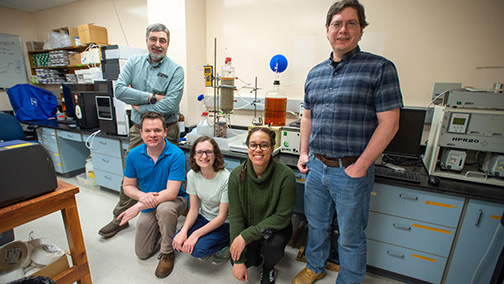by Tim Crosby
CARBONDALE, Ill. – A team of scientists from Southern Illinois University Carbondale and one of its private spin-off companies is among the roughly top 10% worldwide of groups vying for $1 million awards aimed at mitigating excess carbon in the environment.

A team of scientists from Southern Illinois University Carbondale and one of its private spin-off companies, Thermaquatica Inc., is among the top 60 teams worldwide vying for a $1 million award from the XPRIZE Carbon Removal challenge. The team includes, from the left, Ken Anderson, director of SIU’s Advanced Energy Institute and Thermaquatica Inc. founder; Derek Perry, technician from SIU’s School of Earth Systems and Sustainability and Thermaquatica Inc. associate; graduate students Tia Zimmerman and Jennifer Pierce, and Scott D. Hamilton-Brehm, associate professor of microbiology. Not pictured: John Yingling of Thermaquatica Inc. (Photo provided)
The Elon Musk Foundation announced Tuesday it has placed Carbon Down Under, a team largely made up of SIU faculty and researchers, in the top 60 applicants out of some 500 worldwide for its XPRIZE Carbon Removal challenge. The advancement puts the team in position to be among the 15 winners announced on Earth Day, April 22, that will win a $1 million, phase 1 award.
“What we’re trying to do is get out in front of the world and let them know we have a really viable plan that could make a big difference,” said Ken Anderson, founder of team sponsor Thermaquatica Inc.. “We think our Carbon Down Under technology can go a long way in helping us correct some of the mistakes of the past.”
Anderson, professor of geology and director of the Advanced Energy Institute at SIU, started Thermaquatica as an SIU spin-off company 10 years ago. The Thermaquatica team’s advancement announced today represents an upgraded, full-team entry that extends the SIU student team’s win in November 2021.
The SIU student team, made up of graduate students Jennifer Pierce, Tia Zimmerman and faculty member Scott D. Hamilton-Brehm, associate professor of microbiology, was among only 23 student teams in the world to win the XPRIZE Carbon Removal challenge. The student team will receive an initial award of $125,000, with a second $125,000 award contingent on filing a satisfactory June 1 progress report.
The global contest is aimed at fighting climate change and rebalancing Earth’s carbon cycle. Funded by Elon Musk and the Musk Foundation, the $100 million competition is the largest incentive prize in history.
Both the SIU student team and the Thermaquatica team are pursuing a technology dubbed Carbon Down Under, which would liquefy everyday waste biomass – everything from grass clippings to scrap vegetables – for injection into underground storage, such as empty oil reservoirs. Once underground, their plan calls for hungry microbes to consume the carbon-rich liquid and sequester it, preventing it from re-entering the atmosphere where it would contribute to climate change.
The Thermaquatica team comprises Anderson, Hamilton-Brehm, Zimmerman and Pierce, along with John Yingling of Thermaquatica and Derek Perry, a technician from SIU’s School of Earth Systems and Sustainability and a Thermaquatica associate.
While the student team’s focus is in the laboratory, the Thermaquatica team is concentrating on how the technology would work in a scaled-up, real world scenario. An important difference in the application process involved the requirement that Thermaquatica hire independent, outside engineers to evaluate the developing technology and its potential application on a large-scale basis. To that end, Thermaquatica hired Patrick Engineering, a nationwide firm, which certified the team’s approach to the carbon sequestration effort, Anderson said.
“Climate change is a very serious problem facing our global community, but I am hopeful and excited to be working on a solution with Thermaquatica Inc. that is being vetted through Patrick Engineering and XPRIZE as one viable path towards living in equilibrium with our home world,” Hamilton-Brehm said.
